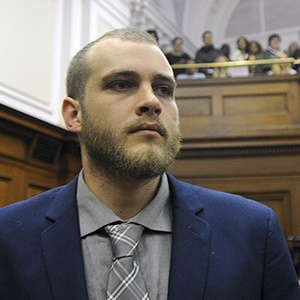Triple axe murderer Henri van Breda's application for leave to appeal his conviction and sentence raises a constitutional issue, as the onus had seemingly been on him to prove his version was reasonably, possibly true, papers filed at the Constitutional Court argue.
His attorney Lorinda van Niekerk said in an affidavit this week that this was an issue, as it was actually the State which was required to prove Van Breda's guilt beyond reasonable doubt.
This is Van Breda's fourth application for leave to appeal, having previously been denied by the Supreme Court of Appeal (SCA) on two occasions, and the Western Cape High Court.
In her 53-page affidavit to the highest court in the land, Van Niekerk set out all the grounds for their application, and explained why they differed from what Judge Siraj Desai had found when convicting and sentencing her client.
In May 2018, Desai gave Van Breda three life sentences for the murders of his parents and brother, 15 years for the attempted murder of his sister, and one year for obstructing the course of justice.
"It is submitted that the Court a quo erred and misdirected itself by concluding that the proven facts are only consistent with a finding that the applicant was the person who attacked his family; and that the proven facts exclude as a reasonable inference, that the applicant’s exculpatory version is reasonably possibly true," said Van Niekerk.
She believed the court had made a number of incorrect factual findings on material aspects, had relied on hearsay evidence without alerting them prior to judgment, and attached no or little weight to the defence's expert witnesses without justification.
"In some instances, the evidence of these experts was not even gainsaid."
The court had also erred, she argued, by making adverse credibility findings against Van Breda based on its finding that he had altered his version "in circumstances where the essence of his version had remained consistent throughout".
When it came to anomalies in the bloodstain evidence, the court came to an incriminating inference, rather than one which inferred their client was innocent, she said.
"Similarly, the absence of any blood whatsoever underneath his socks would fit in with his version as a bystander, but makes it highly improbable that he manages to carry out the attacks on [four] family members, drags Rudi around in a pool of blood after he attacked him, yet manages to avoid stepping in any blood."
Van Breda's team argued that, if the premeditated murder convictions were substituted with murder, it was submitted that imposing life sentences was "shockingly excessive and inappropriate" and they would have a reasonable prospect of successfully appealing them.
Last month, Supreme Court of Appeal Judge President Mandisa Maya dismissed Van Breda's third application for leave to appeal his conviction and sentence.
Eric Ntabazalila, the National Prosecuting Authority spokesperson for the Western Cape region, said the State had until June 14 to file opposing papers in the Constitutional Court.
